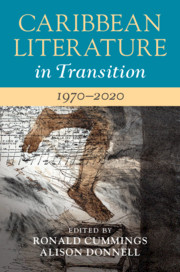Book contents
- Caribbean Literature in Transition, 1970–2020
- Caribbean Literature in Transition
- Caribbean Literature in Transition, 1970–2020
- Copyright page
- Contents
- List of Illustrations
- Contributors
- Acknowledgements
- Introduction: Caribbean Assemblages, 1970s–2020
- Part I Literary and Generic Transitions
- Part II Cultural and Political Transitions
- Part III The Caribbean Region in Transition
- Part IV Critical Transitions
- Chapter 20 Dialogic Connections in Caribbean Literature and Visual Art
- Chapter 21 From Countertextuality to Intertextuality: Continuing the Caribbean Canon
- Chapter 22 Caribbean Eco-Poetics: The Categorial Imperative and Indifference in the Caribbean Environment
- Chapter 23 Sexual Subjects
- Chapter 24 Caribbean Literature and Literary Studies: Past, Present and Future
- Bibliography
- Index
Chapter 22 - Caribbean Eco-Poetics: The Categorial Imperative and Indifference in the Caribbean Environment
from Part IV - Critical Transitions
Published online by Cambridge University Press: 16 December 2020
- Caribbean Literature in Transition, 1970–2020
- Caribbean Literature in Transition
- Caribbean Literature in Transition, 1970–2020
- Copyright page
- Contents
- List of Illustrations
- Contributors
- Acknowledgements
- Introduction: Caribbean Assemblages, 1970s–2020
- Part I Literary and Generic Transitions
- Part II Cultural and Political Transitions
- Part III The Caribbean Region in Transition
- Part IV Critical Transitions
- Chapter 20 Dialogic Connections in Caribbean Literature and Visual Art
- Chapter 21 From Countertextuality to Intertextuality: Continuing the Caribbean Canon
- Chapter 22 Caribbean Eco-Poetics: The Categorial Imperative and Indifference in the Caribbean Environment
- Chapter 23 Sexual Subjects
- Chapter 24 Caribbean Literature and Literary Studies: Past, Present and Future
- Bibliography
- Index
Summary
Caribbean eco-poetics takes the categorial imperative – the culmination of the long history of Western separation of human and nature in the Enlightenment/colonial mandate to categorize and systematize, to collect and enclose, to divide and conquer – as part of the violence of colonialism. Caribbean eco-poetics offers ways of articulating the endless transitions, the perpetual revolutions, and the inextricable imbrications of humans with not only nature, animals and things but also of all those with spirits, folk figures and divine forces that are endemic in the Caribbean. This essay examines how Caribbean eco-poetics return to the colonial archive to examine the naturalization of the categorial imperative and to recuperate its victims, reconfigure the garden and gardening as ways to reinhabit and reconfigure the categorial imperative, write worlds where indifferences of human, animal, spirit, genre are manifest, and include indifference to binary gender and heteronormativity.
Keywords
- Type
- Chapter
- Information
- Caribbean Literature in Transition, 1970–2020 , pp. 371 - 385Publisher: Cambridge University PressPrint publication year: 2021

